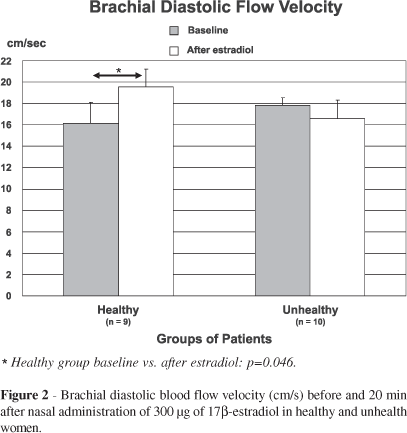OBJECTIVES: To report on a simple practical test for assessing acute estradiol vascular effects on healthy and unhealthy postmenopausal women. INTRODUCTION: Estradiol acts in the endothelium to promote vasodilatation through genomic and non-genomic mechanisms, but its vascular action may be impaired in diabetes mellitus, hypertension, smoking and obesity. METHODS: Nineteen postmenopausal women (nine healthy and 10 with two or more of the above factors) of similar age and time since menopause were examined with vascular Doppler ultrasound. Resistance indexes and systolic and diastolic flow velocities were determined for the brachial and internal carotid arteries at baseline and 20 minutes after administration of a nasal estradiol formulation, available on the market, which reaches 1,200-1,500 pg/ml in the serum in 10-30 minutes. Estradiol blood levels were measured at 30 minutes. RESULTS: The carotid resistance index increased 14.2% (vasoconstriction) in the unhealthy group after estradiol, from a mean ± S.E. of 0.56 ± 0.016 at baseline to 0.64 ± 0.05 (p=0.033), and remained unchanged in healthy women. Brachial diastolic flow velocity increased 19.7% (vasodilatation) in healthy women, from 16.2 ± 1.93 to 19.4 ± 0.64 cm/s (p=0.046), and did not change in the unhealthy subjects. Estradiol levels were similar in both groups. DISCUSSION: Healthy postmenopausal women showed brachial vasodilatation while unhealthy postmenopausal women displayed vasoconstriction at the carotid artery. Vascular responses to estradiol were divergent between the groups. CONCLUSIONS: The acute estradiol test, coupled with Doppler ultrasound, seemed to be able to differentiate women with normal and abnormal endothelial function in a simple, non-invasive manner.
Hormone replacement therapy; Estrogen; Vascular endothelium; Vasodilatation; Vasoconstriction


